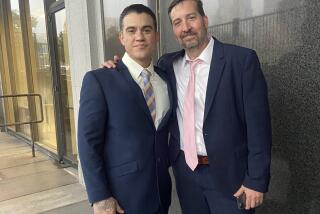El Paso man convicted of double murder at 16 expected to be freed
- Share via
A Texas man is likely to be released from custody Tuesday, nearly 20 years after he was imprisoned for two murders that he and his supporters say he did not commit.
Daniel Villegas’ case has galvanized support among hundreds of people in El Paso — including two men who survived the shooting and the foreman of the jury that convicted him — and has drawn national attention to the number of suspects who falsely confess to crimes.
Villegas, now 36, has been serving a life prison term since a jury convicted him in 1995 of killing Robert England, 18, and Armando Lazo, 17.
An appellate court vacated the conviction in December, and on Monday, District Judge Sam Medrano set a bond hearing for Tuesday. The judge has indicated that he will consider Villegas’ request to be released on bond while the district attorney decides whether to seek a new trial.
Villegas’ attorney, Joe Aureliano Spencer Jr., said he would ask that Villegas be released on a personal recognizance bond.
“He’s certainty not a danger to the community,” Spencer said.
Villegas’ supporters hope the district attorney will decline to seek another trial — a decision that would end an odyssey that turned a boastful teenager with a third-grade reading level into a national emblem for justice.
“It’s been a struggle,” said John Mimbela, an El Paso businessman who took on Villegas’ case seven years ago and has financed much of his unusual appeal. “We could make history.”
El Paso County Dist. Atty. Jaime Esparza, who was newly elected to his position at the time of Villegas’ conviction and tried the case personally, did not return a phone call Monday seeking comment. He has told The Times in the past that Villegas received a fair trial.
His spokeswoman, Renee Railey, said prosecutors would need to “look at the case pretty hard” before determining whether to bring it to trial again, or dismiss the charges against Villegas.
“We’re not close to that decision,” she said.
The drive-by killings took place in spring 1993. Police painted the crime as the work of a gang against a rival.
The only physical evidence was shell casings. Villegas’ conviction was based almost entirely on his one-page, dictated confession, which did not match the facts of the case in numerous ways. For example, Villegas claimed that he was riding that night in a car driven by a man who was in prison at the time. Villegas said the car was white; it was red.
Authorities also knew that Villegas had bragged to a cousin about carrying out the killings with a shotgun; in fact, a small-caliber handgun had been used. Villegas, a dropout who lived in a poor, rough neighborhood, was known for glamorizing the street life, though he had never been booked for a crime more serious than a curfew violation.
Villegas, then 16, recanted his confession quickly, and reported that he had been badgered into delivering it — told that he would be raped in prison if he did not confess, that he would receive the death penalty and that the police would carry it out personally. The confession stood, however.
Villegas’ case drew the support of numerous legal professionals and advocates, including the Center on Wrongful Convictions of Youth at the Northwestern University School of Law.
The center says false confessions are more common than the public understands, particularly among juvenile suspects who wilt under police questioning.
An appellate court found recently that Villegas did not have adequate counsel during his trial. Among the witnesses not called in his defense was a young woman who was prepared to testify that Villegas was baby-sitting at the time of the shooting, according to court documents.
There have been 1,284 exonerations nationwide since 1989, including 158 that involved false confessions, according to the National Registry of Exonerations.
If Villegas is exonerated, he would be eligible for compensation. Texas pays exonerees $80,000 per year spent in prison, plus a monthly annuity and other benefits.
Villegas could also file a lawsuit against police and the city of El Paso.
Times staff writer Molly Hennessy-Fiske in Houston contributed to this report.
More to Read
Sign up for Essential California
The most important California stories and recommendations in your inbox every morning.
You may occasionally receive promotional content from the Los Angeles Times.









